Are you looking for an easy and effective way to do all your crafting projects? Glue guns have become an essential tool in the craft room of any inventive creator. With their simple design and ease of use, they’re sure to quickly become some of your favorite tools. But with so many models out there today, it’s hard to know which one is right for you. One big question that comes up when using this tool: Do hot glue guns turn off automatically?
Table of Contents
What are Glue Guns?
Glue guns are a type of hot melt adhesive applicator, widely popular in DIY and craft projects. They are an electrically-powered device that melts sticks of solid adhesive, which then hardens upon cooling, creating a strong bond between different materials. Adhesive sticks used in guns come in a variety of types, including general-purpose adhesives suitable for bonding a wide range of materials and special-purpose adhesives designed for specific materials like fabric, wood, or in our case, rubber. The effectiveness of a glue gun in adhering to a rubber surface largely depends on the type of adhesive used.
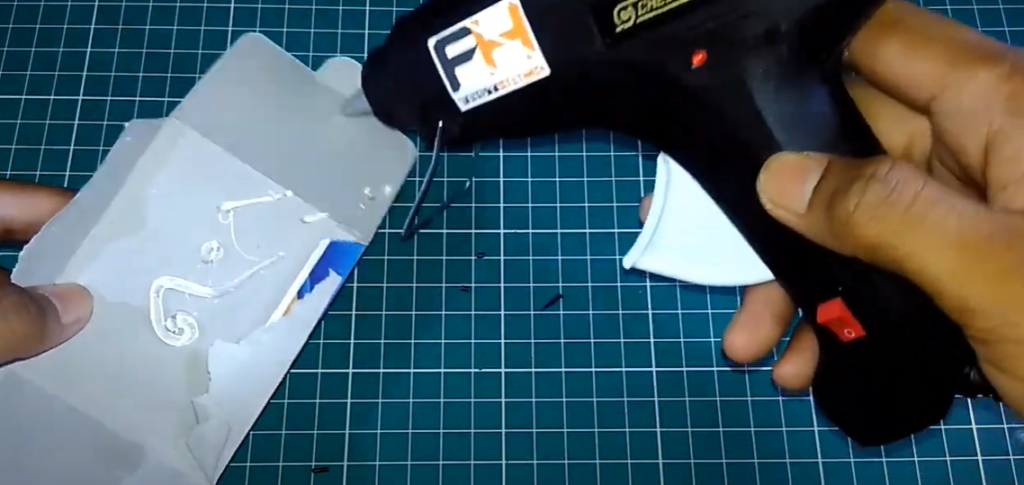
How do they work?
Hot glue guns work on the principle of heating and melting. When a glue stick is inserted into the back of the gun, the warming element, which is located near the front of the gun, begins to heat the stick. The heat melts the glue stick into a liquid state, ready to be dispensed. This process requires a certain amount of time, usually a few minutes, to reach the correct temperature. Once the glue is melted, pressing the trigger mechanism pushes the molten glue out of the gun’s nozzle. [1] The glue that comes out is hot and can adhere to a variety of surfaces, forming a strong bond as it cools and hardens.
Despite this seemingly simple operation, the internal workings of a glue gun are somewhat complex. The heating element, usually a type of resistor, must maintain a constant high temperature to keep the glue in a liquid state. The trigger mechanism, which applies pressure to the glue stick, must be sturdy enough to withstand repeated use. And finally, the nozzle must be designed to withstand the heat of the molten glue and allow the glue to flow freely. It’s this intricate combination of elements that makes hot glue guns such a versatile and effective tool.
Most hot glue guns do not automatically turn off. The majority of models available on the market need to be manually switched off after each use. However, there are some more advanced models that come equipped with an auto shut-off feature, providing an extra level of safety. Always remember to switch off your glue gun when you’re finished using it to prevent any accidents or damage. Additionally, it’s advisable to unplug the glue gun to facilitate proper cooling and conserve energy.
How to Use a Glue Gun
Utilizing a glue gun is straightforward and safe if done correctly. First and foremost, ensure that the workspace is heat-resistant and free of flammable items. To use the hot glue gun, insert a glue stick into the back of the gun and then plug the gun into an electrical outlet to allow it to heat up. This process can take a couple of minutes, depending on the model.
After use, allow the gun to cool down completely before storing it. Importantly, verify whether your model of hot glue gun includes an automated shut-off feature; if not, remember to unplug the gun after use to prevent overheating. [2] Lastly, keep the glue gun out of the reach of children and pets for safety reasons. With these simple steps, you can use this tool effectively and safely for various DIY projects and crafts.
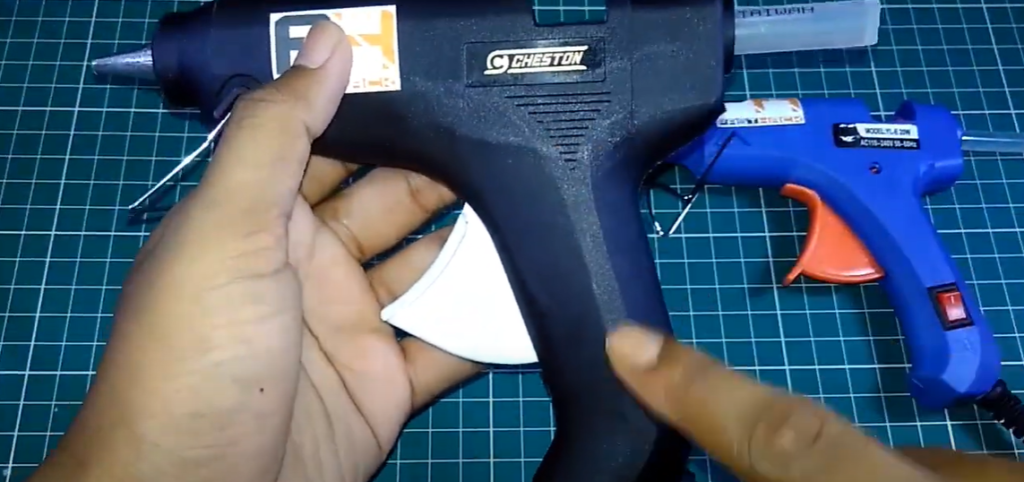
Safety and Advice
As with any tool, there are certain safety precautions to keep in mind when using a glue gun. The most important is to avoid direct contact with the hot glue and the nozzle of the gun, as both become extremely hot during use. Wear heat-resistant gloves to protect your hands from the heat of the molten glue. Additionally, wear safety glasses to protect against any stray glue or sparks. Make sure to never leave it plugged in when not in use. Lastly, make sure to use a heat-resistant surface for your tasks; some materials can melt under high temperatures, making them unsafe to work on.
What happens if I leave a hot glue gun on?
Leaving it on for an extended period can result in several potentially dangerous situations. Firstly, it could lead to the overheating of the gun, which might cause damage to the internal components, especially the heating element, and reduce the lifespan of the tool. Overheating could also lead to the glue stick inside the gun melting excessively, resulting in a glue overflow or leakage, which could not only cause a mess but also possibly burn if someone accidentally comes into contact with it. [3] In extreme cases, a glue gun left on for too long could even make a fire danger, particularly if it’s left unattended close to combustible materials.
That’s why some models come with an auto shut-off feature, which automatically turns off the gun after a certain period of inactivity. However, not all models have this feature, and it’s not a foolproof safety measure. It’s always essential to remember to turn off and unplug your gun after use, and never leave it unattended when it’s plugged in.
Is it bad to leave a hot glue gun on overnight?
Leaving it on overnight is highly inadvisable and can lead to serious consequences. Even if the glue gun is designed with an auto shut-off feature, it is risky to rely on this feature for extended periods such as overnight. The prolonged heat can cause the glue gun to overheat, leading to an internal breakdown of the device components. Overheating can also cause the glue stick to melt excessively, potentially leading to glue overflow or leakage. This not only creates a messy environment but also poses a burn hazard if someone unknowingly comes into contact with the hot glue.
Most worryingly, leaving a hot glue gun on overnight can result in a fire hazard, especially if it’s close to flammable things. Fires initiated under these circumstances can spread quickly, potentially leading to major damage and injury. Therefore, it’s critically important to ensure that a hot glue gun is turned off and unplugged after use, and it should not be left unattended when it’s plugged in. This is necessary not just for the proper maintenance and longevity of the equipment, but also for the safety of individuals and property.
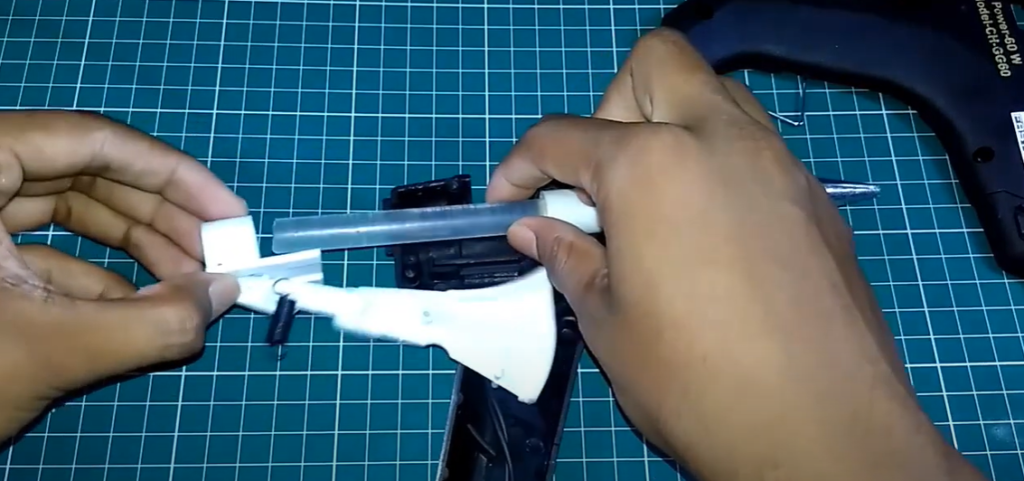
How long do you leave a glue gun on?
The duration for which a hot glue gun is left on largely depends on the specific model of the glue gun and the nature of the work being undertaken. However, as a general rule, it is recommended to keep the glue gun on only for the duration of the task at hand. Once the glue gun has heated up and the glue is ready to be dispensed, the user should complete their gluing tasks as efficiently as possible, and then turn off and unplug the device. This could mean that the glue gun is on for a few minutes to an hour or more, depending on the extent of the task.
However, it is critically important to never leave a hot glue gun on for prolonged periods, such as several hours or overnight, as this poses significant safety hazards and can lead to damage to the tool itself. Although some types are equipped with an auto shut-off feature, this should not be relied upon for extended periods of inactivity. It is always best practice to closely monitor the tool while it’s in use and to turn it off and unplug it when it’s no longer needed. This ensures both the safety of the user and the longevity of the tool.
When not to use a Hot Glue Gun?
While hot glue guns are an incredibly versatile tool, they are not suitable for all materials or conditions. Above all, it is crucial to avoid using a hot glue gun on items that are sensitive to heat, such as flimsy plastic or delicate fabrics, as the high temperature of the glue might melt or distort these materials. Similarly, hot glue is not the best choice for heavy-duty applications or bonding materials under high stress, because the bond may not be strong enough. In addition, hot glue is not recommended for outdoor use where it may be exposed to extreme temperatures.
The adhesive properties of hot glue can deteriorate in very cold conditions, leading to weakened bonds. Conversely, in extremely hot conditions, the glue may soften or remelt, causing the bond to fail. [4] Furthermore, hot glue is not the best adhesive for sealing gaps or filling cracks, as it does not have good gap-filling properties. Lastly, although hot glue is safe for many general crafts and DIY projects, it is not food-safe or suitable for applications that come into contact with food or potable water.
As such, hot glue should not be used for repairing kitchen utensils or any objects that are expected to come into contact with food or drink. Always ensure you choose the right adhesive for your specific needs and safety requirements.
Benefits of using Hot Glue Guns
Hot melt glue guns are a staple tool in any craft or DIY enthusiast’s arsenal and offer a range of benefits over traditional adhesive methods.
- Versatility: Hot glue guns can be used on a wide variety of materials, including but not limited to wood, plastic, ceramics, fabric, and much more. This makes them an excellent choice for a multitude of projects.
- Ease of Use: The operation of a hot glue gun is straightforward and requires no specialized knowledge, making it easy for beginners to pick up and use.
- Quick Drying: Hot glue dries and sets rapidly, saving valuable time on projects that would otherwise require waiting for glue to dry.
- Strong Bond: When used correctly, hot glue can create a durable and sturdy bond that withstands regular wear and tear.
- Safety: Hot glue guns are safer to use than some other adhesive methods. While the glue is hot, there is no risk of fumes or chemical reactions that could pose a threat to the user.
- Cost-Effective: Hot glue guns and glue sticks are relatively inexpensive, making them a cost-effective solution for adhesive needs.
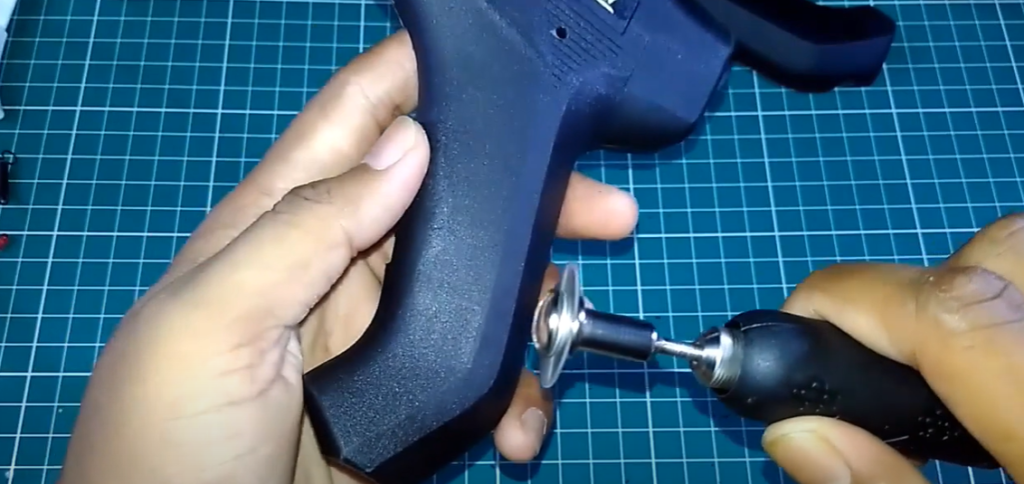
Frequently Asked Questions
Is hot glue flammable when dry?
While hot glue dries to a solid, plastic-like substance, it does not become highly flammable when dry. Under normal conditions, dried hot glue is not a significant fire risk. However, it’s important to note that if exposed to a heat source or open flame, it can catch fire, just like many other materials. Additionally, when burned, hot glue can produce harmful fumes, so it’s always important to use it in a well-ventilated area away from open flames or other sources of high heat.
How long does it take for a hot glue gun to cool off?
The cooling time for a hot glue gun can vary depending on its make and model, as well as the heat setting it was used on. However, generally, a hot glue gun may take around 15 to 30 minutes to cool off completely after being turned off and unplugged. Given the high temperatures these tools can reach, it’s essential to handle a recently used glue gun with care and to ensure it’s fully cooled down before storing it away. It’s also recommended to keep the glue gun on a heat-resistant surface while it cools down to prevent any potential heat damage to the surrounding area.
Can a hot glue gun cause a fire?
Yes, a hot glue gun can potentially cause a fire if not used properly or left unattended. The tip of a hot glue gun can reach high temperatures, posing a risk if it comes into contact with flammable materials. Additionally, if left plugged in for extended periods, it could overheat, which can also increase the risk of starting a fire. Therefore, it’s essential to always monitor a hot glue gun when in use, avoid contact with flammable materials, and unplug it immediately after use. Remember, safety should always be the priority when using any tool that generates heat.
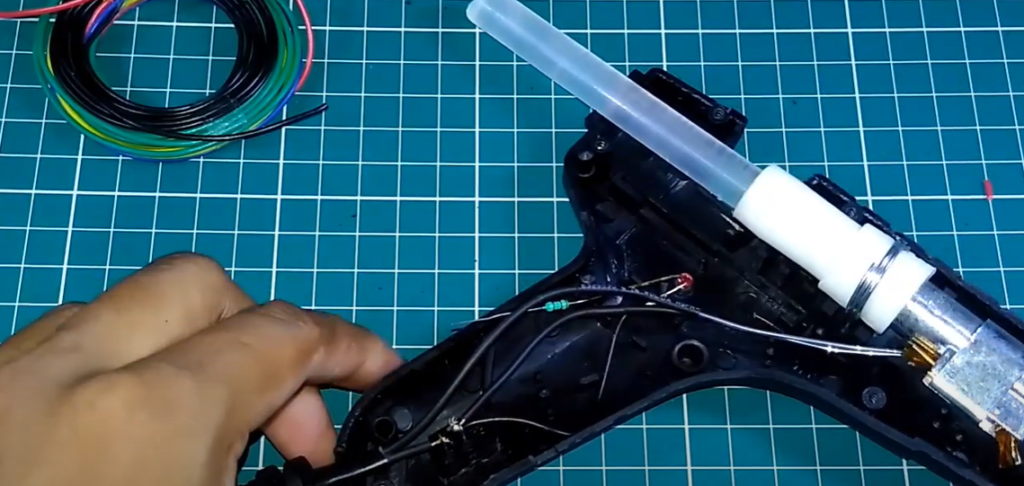
How hot can hot glue get before it melts?
The melting point of hot glue generally lies between 120 to 190 degrees Celsius ( to 374 degrees Fahrenheit). However, this can vary based on the specific formulation and type of the glue. Standard hot glue sticks meant for use with a hot glue gun melt at approximately 160 to 180 degrees Celsius (320 to 356 degrees Fahrenheit). Lower-temperature glue sticks are available as well, which melt at around 120 to 140 degrees Celsius (248 to 284 degrees Fahrenheit). It’s important to note that using a glue stick at a temperature higher than its intended melting point can cause the glue to degrade or burn, affecting its adhesive properties and potentially producing harmful fumes.
When not to use hot glue?
Hot glue is a great adhesive for many general craft and DIY projects, but there are certain circumstances in which it should not be used. Hot glue is not recommended for outdoor applications due to its sensitivity to extreme temperatures. Additionally, hot glue should never be used on items that are sensitive to heat or under high stress, such as lightweight plastics and delicate fabrics. It is also not suitable for items that come into contact with food or potable water, as it is not food-safe. Moreover, hot glue does not have good gap-filling properties, so it should not be used to fill cracks or seal gaps. Therefore, when choosing an adhesive for a project, always consider its intended use and any safety requirements before selecting the appropriate product.
Useful Video: How to set switch and Power Indicator on Glue gun (Glue Gun Mod)
Conclusion
In the realm of DIY projects and crafts, hot glue guns have proven themselves to be a valuable, versatile, and efficient tool. Their easy operation, quick-drying properties, strong bonding ability, and relative safety make them a favored choice for beginners and veterans alike. Their cost-effectiveness further adds to their appeal, offering a diverse range of adhesive capabilities on a budget. However, while hot glue guns have many advantages, they must be used appropriately and safely to prevent potential hazards. This includes understanding the limitations of hot glue, such as its inability to withstand extreme temperatures or adhere to heat-sensitive materials, and its unsuitability for food-related applications. With a mindful approach to handling and usage, a hot glue gun can serve as a cornerstone tool in your creative toolkit, empowering you to bring a multitude of projects to fruition.
References:
- https://www.ehow.com/how-does_4897114_hot-glue-gun-work.html
- https://clevercreations.org/how-to-use-hot-glue-gun/
- https://www.gluegunsdirect.com/service-and-advice/glue-gun-safety-advice/
- https://www.chemical-concepts.com/how-does-cold-weather-affect-adhesives/

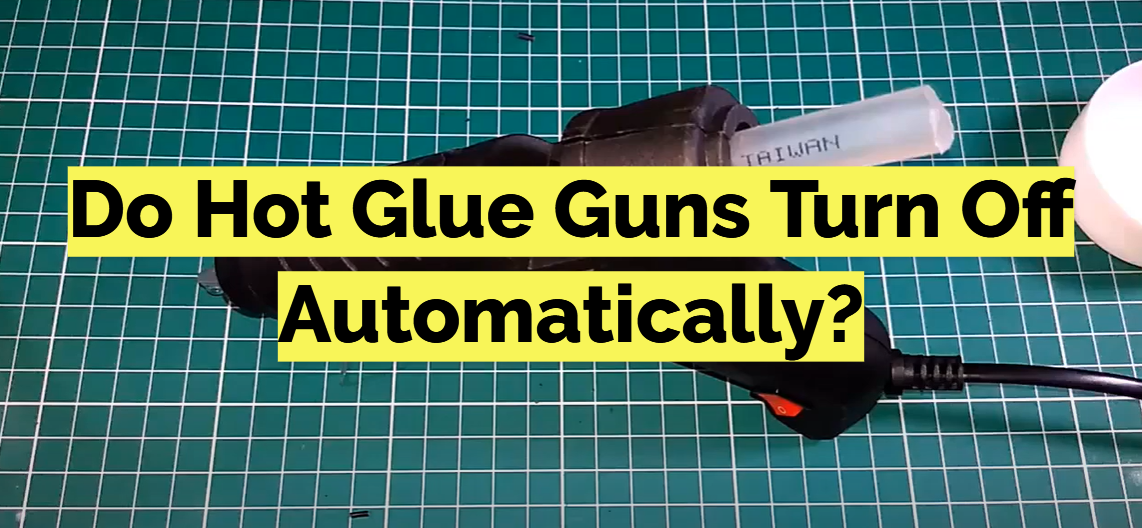


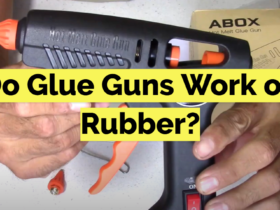

Leave a Reply